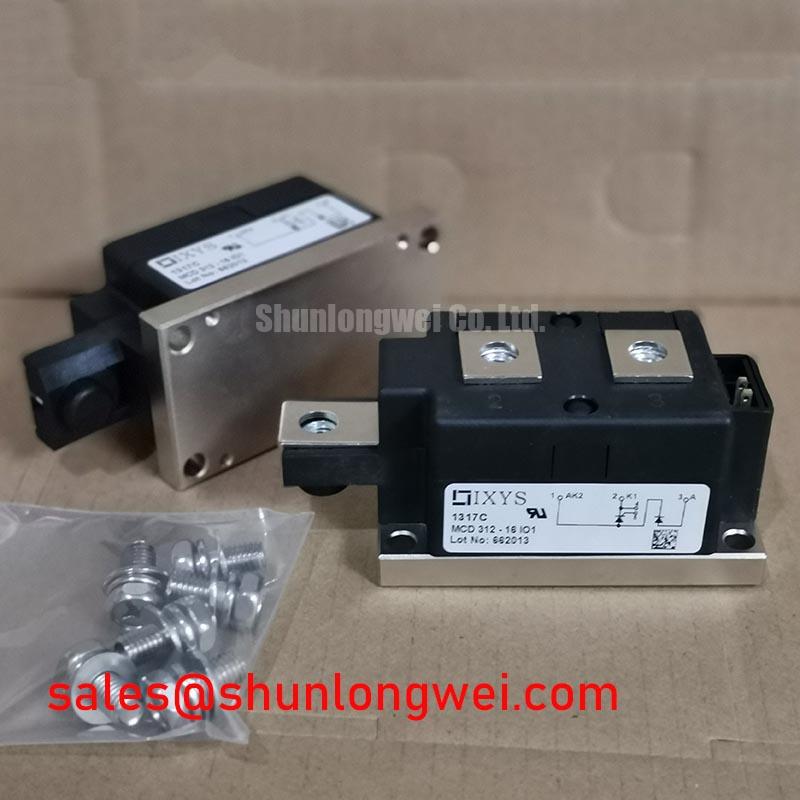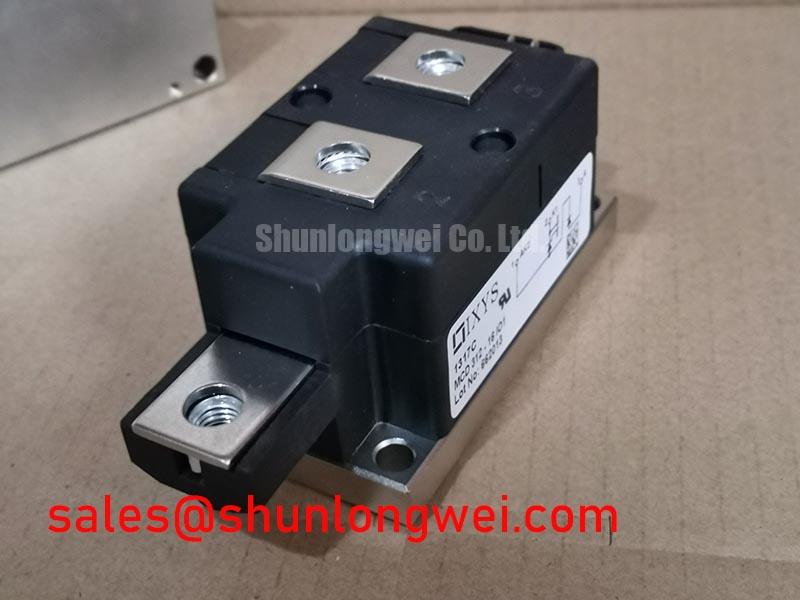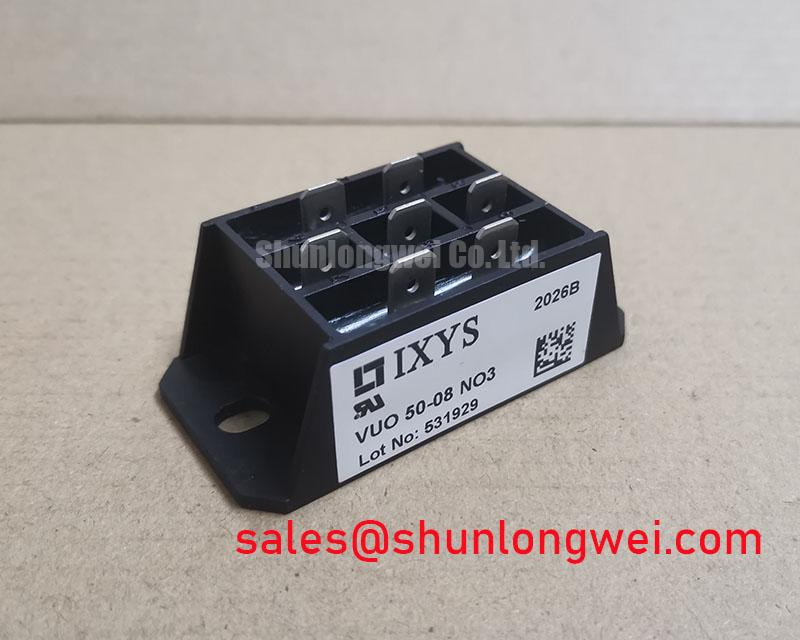Content last revised on November 7, 2025
MCD312-16io1: High-Reliability 1600V Thyristor/Diode Module
Product Overview & Key Specifications
Engineered for Longevity in High-Power Control Systems
The IXYS MCD312-16io1 is a high-performance thyristor/diode module designed for superior reliability in demanding industrial power conversion applications. Its core value proposition lies in the use of advanced pressure contact technology, which ensures exceptional thermal performance and operational stability over an extended lifetime. This module features key specifications of 1600V repetitive peak voltage, a robust average on-state current of 312A, and high electrical isolation of 3000V~. Key engineering benefits include enhanced thermal cycling capability and the elimination of solder fatigue failure modes. The design directly addresses the need for robust power control in industrial motor drives by providing a component that withstands high-stress electrical and thermal conditions without degradation. For industrial systems requiring precise control and long-term reliability on 600V to 690V AC lines, this 1600V module provides a secure design margin.
Key Parameter Overview
Decoding the Specs for Enhanced Thermal Reliability
The electrical and thermal characteristics of the MCD312-16io1 are optimized for high-power, phase-control applications. The parameters below highlight its suitability for robust industrial designs where both performance and long-term reliability are critical decision factors. The low thermal resistance is a direct result of its advanced packaging and pressure contact design, facilitating more efficient thermal management solutions.
| Parameter | Value | Notes |
| Repetitive Peak Reverse/Off-State Voltage (VRRM/VDRM) | 1600V | Provides significant safety margin for operation on 600V and 690V AC lines. |
| Average On-State Current (ITAV) | 312A (TC = 85°C) | Enables high power throughput for demanding loads like large industrial motors. |
| RMS On-State Current (ITRMS) | 550A | Defines the maximum continuous current handling capability. |
| Isolation Test Voltage (VISOL) | 3000V~ (50/60 Hz, RMS, t = 1 min) | Ensures high electrical safety and simplifies system-level insulation requirements. |
| Thermal Resistance, Junction-to-Case (RthJC) | 0.075 K/W (per Thyristor) | Key metric indicating highly efficient heat transfer, crucial for reliability. |
Download the MCD312-16io1 datasheet for detailed specifications and performance curves.
Application Scenarios & Value
Achieving System-Level Benefits in Industrial Motor Control
The MCD312-16io1 is ideally suited for a range of high-power control applications where reliability is paramount. Its robust design provides significant value in systems that experience frequent thermal and electrical stress. What is the primary benefit of its pressure-contact design? Enhanced long-term reliability by eliminating solder fatigue.
Consider a high-inertia conveyor system in a mining operation, driven by a large AC motor. The system requires a soft starter to manage the immense inrush current during startup and to provide controlled deceleration. The repeated start/stop cycles create significant thermal stress within the power electronics. The MCD312-16io1 excels in this scenario. Its pressure contact construction is inherently resilient to thermal fatigue, unlike soldered modules which can develop micro-cracks over thousands of cycles. This design integrity ensures a longer operational life and reduces the risk of costly downtime. The module's high surge current capability (ITSM) comfortably handles the motor's startup demands, making it a reliable core for building robust soft starters and AC Motor Drives. For systems controlling even larger loads, the related MCC200-16io1 offers a higher current rating within a similar voltage class.
Frequently Asked Questions (FAQ)
What is the key advantage of the pressure contact technology used in the MCD312-16io1?
The primary advantage is a significant increase in long-term reliability. By eliminating solder layers between the silicon chip and the baseplate, it removes a common failure point—solder fatigue—which is critical in applications with frequent temperature changes, such as motor drives or renewable energy converters.
How does the 3000V~ isolation rating benefit system design in industrial environments?
This high isolation voltage provides a robust safety barrier between the high-power circuit and the control electronics or heatsink. It simplifies compliance with safety standards like those from NEMA and IEC, potentially reducing the need for additional, bulky insulation materials and allowing for a more compact and cost-effective overall system design.
Is the 1600V VDRM rating of the MCD312-16io1 sufficient for 690V AC line applications?
Yes. A 1600V rating provides a substantial design margin for rectifiers operating on a 690V AC line. This margin is crucial for handling transient overvoltages and line fluctuations common in industrial settings, directly contributing to the system's robustness and preventing component failure.
Can two MCD312-16io1 modules be used to create a three-phase controlled bridge rectifier?
Yes, the module's configuration with one thyristor and one diode is ideal for building controlled rectifiers. Three such modules can be configured to create a B6C (fully controlled) or B6H (half-controlled) three-phase bridge, making it a versatile building block for various power converter topologies.
Technical Deep Dive
A Closer Look at Pressure Contact Technology for Enhanced Operational Lifetime
The engineering philosophy behind the MCD312-16io1 centers on maximizing its operational lifespan under harsh conditions. A critical element of this is its pressure contact technology. Unlike conventional modules where silicon dice are soldered to a ceramic substrate, which is then soldered to a copper baseplate, this design uses precisely engineered mechanical pressure to maintain all electrical and thermal connections. This seemingly simple change has profound implications for reliability.
Think of it like a high-end mechanical watch movement that uses precisely tensioned screws and springs instead of adhesive. The connections remain stable and reliable through years of stress, whereas solder joints can degrade over time, much like how glue can become brittle and crack with age and temperature shifts. This solder-free interface between the chip and the heatsink path results in a very low thermal resistance (RthJC). Why is low thermal resistance so critical? It means heat generated by the thyristor can escape to the heatsink more efficiently, keeping the junction temperature lower and dramatically slowing down age-related degradation mechanisms. For an engineer, this translates to either a longer system life at a given power level or the ability to push more power through the device while maintaining a safe operating temperature. It is this focus on mastering thermal management that sets the MCD312-16io1 apart for critical systems.
Strategic Value and System-Level Impact
Optimizing Total Cost of Ownership Through Component Reliability
Selecting the MCD312-16io1 is a strategic decision that extends beyond initial component cost to impact the total cost of ownership (TCO) of the end equipment. By designing with a module that inherently mitigates common failure modes like solder fatigue, engineers can build systems—be it industrial Variable Frequency Drives (VFDs), soft starters, or high-power DC supplies—that require less field maintenance and offer superior uptime. This long-term reliability translates directly into a stronger value proposition for the final product, reinforcing brand reputation and customer satisfaction in markets where operational continuity is non-negotiable.













